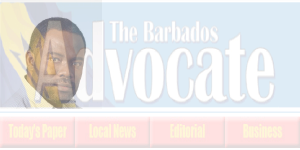
BU shares the Jeff Cumberbatch Barbados Advocate column – Senior Lecturer in law at the University of the West Indies since 1983, a Columnist with the Barbados Advocate since 2000 and BU commenter – see full bio.
[…]
MUSINGS : The Scholar’s Tale
8/30/2015
He had but little gold within his coffer;
But all that he would borrow from a friend
On books and learning he would swiftly spend…
Pregnant of moral virtue was his speech
And gladly would he learn and gladly teach…The Canterbury Tales – The General Prologue
The epigraph above describes some aspects of Chaucer’s clerk who, at the time he wrote, did not fulfil the role of lowly gopher as is the case today, but that of a scholar to whom, it is said, writing was entrusted because most laymen could not read. Chaucer further states “…of study took he utmost care and heed; not one word spoke he more than was his need; and that was said in fullest reverence, and short and quick and full of good high sense…”
Of course, the intention here is not to attempt an analysis of Chaucer’s work but rather to comment critically on the current state of local university education primarily in light of two news items on consecutive days last week. These were, first, that the August salaries of university staff at the Cave Hill Campus of the University of the West Indies were delayed owing to what has been described as “a cash crunch” and that there were proposals to withhold the payment of contractually agreed increments for one year; and second, that the number of student enrolments had again decreased significantly from those of 2014-15 for the upcoming academic year; a phenomenon attributed to the officially instituted policy of having local students contribute one-fifth of the cost of their programmes. The principal of the Cave Hill Campus has reiterated the call for a re-think of the policy in light of the dwindling numbers.
It is at least doubtful whether these calls will be heeded anytime soon, given the negative response so far and the reluctance of regional administrations in general to reverse a policy once instituted. Nor does the history suggest that an electoral change in administration is likely to effect any change in this regard; the continued existence to this day of the Public Order Act and of the Constitutional amendments of 1974, to name two, both of which were the subject of partisan promises to reform, offers cogent and depressing evidence of this thesis.
I have already made it clear in this space on more occasions than one that while I understood the necessity for the measure at the time of patent economic stringency, I could not agree with its mode of summary implementation; a strategy that would certainly have dislocated the financial arrangements of those who were already engaged in a programme of study and who had already committed themselves to the likely cost of their studies over the period.
The new policy however failed to make any distinction between these students, those about to enter the Campus for the first time and those still at primary school, for that matter. Yet a rudimentary analysis should have led to an appreciation that these were not similarly situated and that best practice in administration should have required at least the provision of adequate notice of the variation to existing students so as not to frustrate the legitimate expectations of this most vulnerable category.
Be that as it may, this strategy was not employed and necessary adjustments had to be made. Some have chosen to forgo their studies temporarily; others we may never see again in the Cave Hill lecture theatres and seminar rooms. That is a pity. Further, the drop in enrolments this academic year signals that the provision of state bursaries and the numerous grants and scholarships and revised payment plans offered by the campus itself have not succeeded in stemming the haemorrhage of withdrawal.
As has been argued previously, the university experience is not solely about obtaining an official certification for upward social and financial mobility but more so about acquiring improved skills of thinking, argument and expression. On the basis of this assertion, the greater the number of such persons within a society, the more effective the democratic ideal will be there by virtue of the more frequent and intelligent exercise of the right to freedom of expression and the demand for access to official information.
In my opinion, therefore, a reduction in the number of undergraduates and graduates, as has been reported, might arguably avail the state coffers in the short-term. I am less certain, however, that it will avail the quality of governance within the state itself.
So far as the “cash crunch” affecting salaries is concerned, indeed this impacts significantly upon the author. My colleagues in another place were quite good-natured about it yesterday; surmising that I would now have to make do with, in their words, “a million or so less per annum”. This ribbing I am prepared to accept in the spirit of hyperbole in which it was given. And since the matter is currently in the process of sensitive discussion, I cannot usefully add anything of substance here. Nevertheless, this state of affairs may yet herald the establishment of an even more commercial campus, one trading in the currency of knowledge and contracted research.
Permit me to extend my condolences and sympathy to those in the nature isle of Dominica who lost loved ones or property in the aftermath of the passage of Tropical Storm Erika last week. To those of us not directly in the hurricane belt (some ascribe it to divine intervention), we may marvel only at scenes of the destructive force of this phenomenon. May your recovery from the present grief be swift.





The blogmaster invites you to join the discussion.